Macedonia: the bitter taste of independence
Modern Macedonia is not identical to that historical, ancient Macedonia, whose famous ruler was included in all history textbooks. No, of course, part of modern Macedonia in ancient times was still part of the Macedonian kingdom - only the most southern part. And modern Macedonia occupies the northwest of a vast historical area. This region is now divided between three states - Greece (southern part - Aegean Macedonia), Bulgaria (north-eastern part - Pirin Macedonia) and Macedonia proper (Vardar Macedonia).
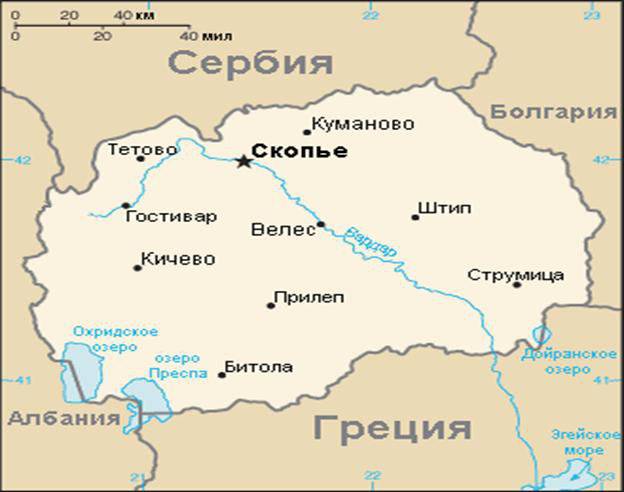
However, Greece, after the appearance of sovereign Macedonia in 1991, categorically protests against the use of this name by the country, seeing in it the attempt on its northern region of the same name. Therefore, in the United Nations, at the insistence of Greece, the name “Former Yugoslav Republic of Macedonia” is used with reference to Macedonia. In itself, such a designation emphasizes some of the artificiality of this state, existing last 23 year. Indeed, if you look closely at the history of Macedonia, it becomes clear that all of it is full of uncertainties even regarding the national identification of the Macedonians themselves.
Macedonians and the phenomenon of "ethnic construct"
The Macedonians are a small nation attributed by ethnographers to the southern Slavs. However, the views of the Macedonians' nearest neighbors regarding the ethnicity of the latter differ. So, in Bulgaria the point of view is widespread that the Macedonians are Bulgarians, and the Macedonian language is a dialect of the Bulgarian language. In Greece, it is generally accepted that the Macedonians are none other than the Slavicized Greeks, who have been subject to Bulgarian and Serbian influence. Finally, in Serbia, one can find allegations that the Macedonians are Serbs who have been subject to Bulgarian influence, or that the Macedonians are an independent people (these Serbian historians have sought to secure the territory of Macedonia, which was part of Yugoslavia, from claims from Bulgaria, which saw the group of Bulgarian population in Macedonians). In fact, the territory of Vardar Macedonia - that is, the actual modern Republic of Macedonia, was historically inhabited by both Serbs and Bulgarians. The upheavals of the historical and political development of this region led to the "Bulgarianization" of the Serbs and the simultaneous formation of two identities among the local population - the Bulgarian, characteristic for the period until the second half of the twentieth century, and the Macedonian, characteristic of the more modern period of history.
Strictly speaking, the ethnic identity of modern Macedonians was formed only in the twentieth century, after the end of the Second World War. As you know, there are two main approaches to ethnic identity - primordialism and constructivism. Primordialism considers ethnos as a kind of initial commonality with given characteristics, whose formation took place historically and by itself. Constructivism, on the contrary, believes that the emergence of ethnic groups and ethnic identities occurs through artificial design in accordance with the interests of certain political elites. So, the Russian researcher V.A. Tishkov, who can be counted among the leading domestic representatives of the constructivist concept of ethnic identity, considers ethnos as the result of targeted efforts to create it, “nation-building”. So, the emergence of Macedonian ethnic identity fully fits into the constructivist concept of the origin of ethnic groups.
Up until the beginning of the 20th century, the territory of the historical region of Macedonia was part of the Ottoman Empire and was inhabited by a multinational population. It was inhabited by Greeks, Albanians (Arnauts), Aromani (a small Roman-speaking people, akin to Romanians), Bulgarians, Gypsies, Jews. In southern Aegean Macedonia, the Greek and Greek speaking population prevailed, while Serbs and Bulgarians inhabited Vardar and Pirin Macedonia.
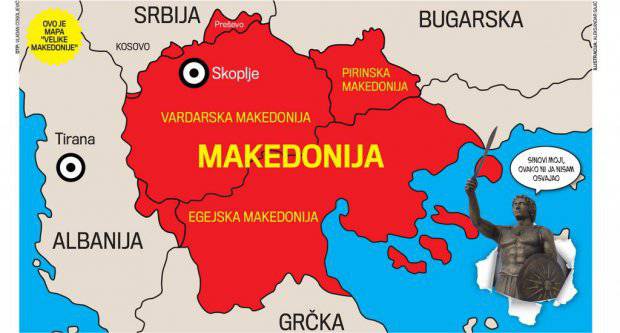
Russian-Turkish war 1877-1878 gave impetus to a serious redistribution of the political map of the Balkan Peninsula. Following the war, the San Stefan Peace was concluded, according to which the whole of Macedonia was to become part of the Bulgarian principality. However, such a strengthening of the Slavic Orthodox state in the Balkans was not included in the plans of the Western states, which began to protest against the outcome of the San Stefano Peace. On top of that, the Greeks of Aegean Macedonia were not going to be part of the Bulgarian principality and began an uprising. In 1879, at the Berlin Congress, it was decided to leave Macedonia as part of the Ottoman Empire. However, this was not to the liking of the Bulgarians and the Orthodox Slavs of Macedonia. As a result, since the end of the 19th century, Macedonia was shaken by anti-Turkish uprisings, in which both Serbs and Bulgarians took part. At the same time, Bulgaria, Greece and Serbia were leading each - their own game, trying to enlist the support of the Macedonian population and in the event of the collapse of the Ottoman Empire to annex the territory of Macedonia. At the same time, the Greek part of the population of Macedonia naturally went to Greece, while the Slavs tended to favor Bulgaria. By the beginning of the twentieth century. The Macedonian cultural and political elite identified themselves as Bulgarians and wished for the reunification of Macedonia with Bulgaria, which was explained, first of all, by active assistance to the Macedonian rebels from Bulgaria, the opening of Bulgarian schools, churches, and charitable activities in Macedonia. Naturally, Bulgaria sought to instill Bulgarian identity in the Macedonian population, while Serbia opposing it gradually moved away from allegations that Macedonians are Serbs, to more profitable, as Serbian leaders seemed, claims that Macedonians are simply Orthodox Slavic-speaking mass without clear national identity. and, therefore, may lean toward both Bulgarian and Serbian identity.
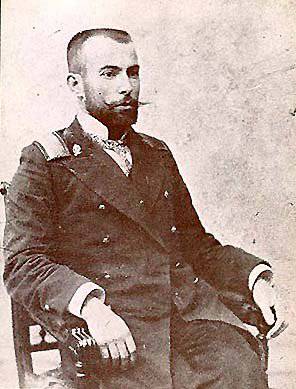 At the same time to the beginning of the twentieth century. the cultural-political concept of “Macedonianism” is also being formed, recognizing the status of a special national community, the Macedonians, behind the Slavic population of Macedonia, and the status of a separate Macedonian language behind the language. At the root of the concept of "Macedonism" stood Krste Petkov Misirkov (1874-1926) - the Macedonian-Bulgarian historian, philologist and political figure. In modern Macedonia, he is considered the father of the theoretical foundations of Macedonian statehood. By the way, Misirkov received his education in Russia - first at the Poltava Theological Seminary, and then at St. Petersburg University, the Faculty of History and Philology with which he graduated with honors. Upon admission to the university, he indicated the nationality of the "Macedonian Slav". In 1903, in Sofia, Misirkov’s book On the Macedonian Question was published, in which he substantiated the originality of the Macedonian language and culture. The political solution of the Macedonian question Misirkov saw in the uprising of the Macedonian population in order to achieve its own autonomous state.
At the same time to the beginning of the twentieth century. the cultural-political concept of “Macedonianism” is also being formed, recognizing the status of a special national community, the Macedonians, behind the Slavic population of Macedonia, and the status of a separate Macedonian language behind the language. At the root of the concept of "Macedonism" stood Krste Petkov Misirkov (1874-1926) - the Macedonian-Bulgarian historian, philologist and political figure. In modern Macedonia, he is considered the father of the theoretical foundations of Macedonian statehood. By the way, Misirkov received his education in Russia - first at the Poltava Theological Seminary, and then at St. Petersburg University, the Faculty of History and Philology with which he graduated with honors. Upon admission to the university, he indicated the nationality of the "Macedonian Slav". In 1903, in Sofia, Misirkov’s book On the Macedonian Question was published, in which he substantiated the originality of the Macedonian language and culture. The political solution of the Macedonian question Misirkov saw in the uprising of the Macedonian population in order to achieve its own autonomous state. Balkan Wars and the Macedonian Rebellion
In 1893, the Macedonian Revolutionary Organization (LRO) was established in the territory of Macedonia, setting as its goal an armed struggle to create an autonomous Macedonian state. In 1896, it was named the Secret Macedonian Revolutionary Organization (TMORO) in the period from 1898 to 1903. led the partisan struggle against the Ottoman administration in Macedonia. In 1903, the famous Ilinden Uprising broke out, as a result of which the Krushev Republic was created, held out for 10 days and destroyed by Turkish troops. After the suppression of the uprising, the organization continued to exist, but underwent an actual split. The left and right factions stood out. The ideological differences between them were fundamental, since the right part of the SMORO favored the inclusion of the Macedonian autonomous state into Bulgaria, and the left part opposed it and considered it necessary to create the Balkan Federation. From 1905, the city of TMORO receives the name of the Inner Macedonian-Odrinsk Revolutionary Organization (SMORO).
The liberation of Macedonia from the dominion of Ottoman Turkey was followed by two Balkan wars 1912-1913. The first Balkan war began on October 9 1912 and ended on May 30 1913. In it, the Balkan alliance consisting of Bulgaria, Greece, Serbia and Montenegro opposed Ottoman Turkey and seriously defeated it. The territory of the former Turkish possessions in the Balkans - Macedonia, Thrace and Albania - was occupied by the allied forces. According to the London Peace Agreement, the Ottoman Empire renounced all Balkan possessions and the island of Crete, the fate of Albania, inhabited largely by Muslims, was subject to separate consideration. Ultimately, the independence of Albania was nevertheless proclaimed, although in reality the Albanian state was in the strongest political and economic dependence on neighboring Austria-Hungary and on Italy, with which the Albanians, especially their Catholic part, had long-standing cultural and economic ties.
The consequences of the war have already caused confrontation between the countries of the Balkan Union. The main reason was the status of Macedonia, which Bulgaria wanted to see in the composition of Great Bulgaria. The Second Balkan War lasted only a month - from June 29 to July 29 1913 and consisted of the hostilities of Serbia, Montenegro and Greece against Bulgaria (later Ottoman Turkey and Romania also went to war with Bulgaria). Naturally, Bulgaria could not resist the coalition of several states and the war ended with the defeat of the Bulgarian army. Following the peace concluded in Bucharest 10 August 1913, Macedonia was divided between Bulgaria, Greece and Serbia. Strictly speaking, this is how the history of the future Yugoslav Macedonia, which emerged on the site of Serbian Macedonia, began.
However, the subordination of Vardar Macedonia to the Serbian kingdom was not part of the plans of the Macedonian elite, who considered themselves Bulgarians and did not want to assimilate into the Serbian environment. Already in 1913, two anti-Serb uprisings were raised - Tikveskoe - June 15, and Ohrid-Debraskoe - September 9. Both uprisings were suppressed by the Serbian forces quite harshly, after which the Inner Macedonian-Odrinska Revolutionary Organization turned to terrorist acts and guerrilla warfare against the Serbian administration of Macedonia. The anti-Serb struggle of the Macedonian rebels intensified after the end of the First World War, whipped up by the Bulgarian special services interested in maintaining the positions of the Pro-Bulgarian forces in the region.
After the collapse of Austria-Hungary, a new state appeared in the Balkans - the Kingdom of Serbs, Croats and Slovenes (KSHS), which in 1929 was renamed the Kingdom of Yugoslavia. The lands of Vardar Macedonia also became part of the Kingdom of Yugoslavia. In 1925, the VMRO, with the support of the Bulgarian special services, established the 15 thousandth partisan army in the Vardar banovina (province) of the Kingdom of Serbs, Croats and Slovenes and launched an armed struggle against the Serbian government. The Bulgarian government was interested in stopping the process of strengthening the Serbian national identity among the Macedonian population and convincing the latter of its belonging to the Bulgarians.
It was during the period of the First World War and the interwar years that the formation of the Macedonian ethnic identity began. In many ways, not without the intervention of the Western powers interested in the disintegration of the Balkan Slavs. The internal Macedonian Revolutionary Organization (VMRO), which arose instead of WEDDING, adopted the idea of creating a “Great Macedonia” as part of Vardar, Pirin and Aegean Macedonia. Thus, a new vast state could appear in the Balkans as an alternative to Greater Bulgaria, Greater Serbia, Greater Greece. Although the idea of creating “Great Macedonia” threatened Bulgaria’s territorial integrity, the Bulgarian government supported the VMRO because it saw in it a tool to counter the strengthening of Yugoslavia’s position. Alexander Protogerov, Todor Alexandrov, Ivan Mikhailov led the VMRO during the interwar period, with the support of both the Bulgarian special services and, on the other hand, the Croatian Ustashes and Albanian nationalists interested in the breakup of Yugoslavia.
The largest terrorist act of the IMRO was the murder in Marseilles in 1934 of the Yugoslav king Alexander I Karageorgievich and the French foreign minister Louis Bart. The Croatian Ustashi and the German Abwehr assisted in the preparation of the terrorist attack of the WMDO. The direct executor of the murder was the Macedonian revolutionary Velichko Dimitrov Kerin, better known as Vlado Chernozemsky - one of the most serious and trained militants of the VMRO. Wounded during an attempt by the police, he died in prison 24 hours after the murder of the Yugoslav king and the French minister. The arrival of the militant and the execution of the assassination were organized by the Macedonian revolutionaries in close conjunction with the Ustashes.
During the Second World War, from 1941 to 1944, the territory of Yugoslav (Vardar) Macedonia was occupied by Bulgaria, which was one of the allies of Nazi Germany. The liberation of Bulgaria by Soviet troops led to the withdrawal of Bulgarian and German military units from Macedonia. For a short time, VMRO intensified here, carrying out a plan to create an Independent Republic of Macedonia, but the introduction of Greek and Yugoslav troops into the region put an end to the activities of prob-Bulgarian Macedonian nationalists.
From socialism to independence
Vardar Macedonia, originally under the name of the People’s Republic of Macedonia, became part of the established Federal People’s Republic of Yugoslavia. In 1963, after the FNRY was renamed the SFRY - the Socialist Federal Republic of Yugoslavia, Macedonia changed its name - it became the Socialist Republic of Macedonia (SRM). In fact, during the period of the existence of socialist Yugoslavia, the policy of strengthening the Macedonian national identity continued, as a result of which the Serbian population of the region was rapidly “Macedonized” and began to consider itself Macedonian. It even created its own Macedonian Orthodox Autocephalous Church, which, however, is still not recognized as a canonical all other Orthodox churches (formerly Macedonian parishioners belonged to the Serbian Orthodox Church). It can be said that the existence in the SFRY was the first real experience of Macedonian statehood, even if autonomous, which initiated the Macedonian national identity. That is, in fact, the socialist regime of Yugoslavia, pursuing a policy of stimulating Macedonian identity, contributed to the final separation of the Macedonian population from the Serbs.
Like other republics that were part of the SFRY, Macedonia had a constitution, a government, a parliament, an official language, and its own academy of sciences and arts. The specificity of the Yugoslav federative state was that, in contrast to the Soviet Union, in addition to the general Yugoslav armed forces, each subject of the SFRY had its own territorial armed forces. There were those in Macedonia. However, within the framework of the SFRY, Macedonia remained the least developed republic. Its economy was seriously inferior not only to the Slovenian and Croatian, but also to the Serbian, Montenegrin and even Bosnian. Despite certain centrifugal sentiments among a part of the intelligentsia, Macedonia did not participate in the process of the breakup of Yugoslavia as actively as Slovenia, Croatia or Bosnia and Herzegovina. Independence of Macedonia 6 September 1991 was obtained by peaceful means and subsequently the Macedonians did not take part in the armed conflicts between Serbs, Croats and Muslims in the territory of Yugoslavia. Obviously, the independence of Macedonia was proclaimed "by inertia" after 25 June 1991 separated Slovenia and Croatia from Yugoslavia - the most industrially developed and culturally close to the countries of the "western" civilizational way of the republic.
What gave Macedonia the proclamation of independence? First of all, the deterioration of the socio-economic situation of the republic. Within the framework of a united Yugoslavia, Macedonia was an economically least developed agricultural region, but its social position was smoothed out by the inclusion of its economy in a single Yugoslav system of economic ties. Today Macedonia is one of the poorest countries in Europe (along with Albania). The absence of serious mineral deposits, low-developed industry - mainly textile, tobacco and distillery, determine the agricultural character of the Macedonian economy. Macedonia grows tobacco, grapes, sunflowers, vegetables and fruits. Livestock also takes place. However, the agrarian sector, especially those represented by weak private farms, cannot guarantee the country even a more or less acceptable economic situation. Moreover, in the European Union spheres of influence on the agricultural products market have long been defined. Like other Balkan states, Macedonia becomes a supplier of cheap labor to neighboring more or less prosperous countries.
"Macedonian Kosovo"
The economic backwardness of Macedonia is aggravated by the presence of extremely serious ethnic conflicts. Despite the fact that Macedonia has a very small population - just a little over 2 million people, representatives of a number of ethnic groups live here. First of all, it is the Macedonians themselves (64%), as well as the Turks, Gypsies, Serbs, Bosnians, Aromane and Meglenites (Roman-speaking peoples). The largest national minority of the country is the Albanians, who make up officially more than 25% of the country's population. The settlement of Albanians in Macedonia began in the years of rule over the Balkans of the Ottoman Empire. In 1467-1468, that is, at the beginning of Ottoman rule on the peninsula, in the entire Macedonian province of the Ottoman Empire, there were only 84 Albanian households. This indicates that Albanians did not actually live in Macedonia, with the exception of 84 households, most likely people who had accidentally settled here.
However, the situation with the resettlement of Albanians changed during the further domination of the Ottoman Empire in the region. Albanians in Ottoman Turkey had a privileged position, primarily because of their greatest Islamization compared to other Balkan peoples. Turks preferred to settle Albanians in the regions inhabited by Slavs, thus diluting the Slavic population and creating “centers of counterweight”. From the time when the independent state of Albania appeared in 1912, the Albanian nationalists were nurturing a project to create a “Great Albania”, into which the western lands of Macedonia were to enter. This project was supported, first of all, by the Italians, who saw Albanian nationalists as agents of their influence in the Balkans, but other Western states, for whom any non-Slavic peoples of Eastern Europe were desirable allies, had nothing against the strengthening of Albanian nationalism (that the Hungarians that Albanians), which could be opposed to the Slavs and, consequently, Russia and the Russian influence in the region.
Albania controlled by the Italian fascists during the Second World War even occupied a piece of Macedonia, thus sharing it with Bulgaria. After the proclamation of independence of Macedonia in 1991, separatist sentiments intensified in the Albanian environment. Albanians boycotted the independence referendum itself. But in 1992, in the Albanian-populated areas of Macedonia, a referendum on autonomy was held, declared invalid by the authorities of the country. Mass riots of Albanians took place in the capital of Skopje, as a result of which several people died. That is, almost from the very beginning of its independent existence, young Macedonia faced the factor of Albanian separatism. Further separatist activity of the Albanian minority was due to several factors. First, Albanians are the most rapidly growing ethnic group in Macedonia. If in the 1991 year they accounted for 21% of the country's population, now it is more than 25%. Albanians have the highest birth rate. Secondly, the separatist struggle of their fellow tribesmen in Kosovo became an example for the Macedonian Albanians. Finally, Albanian separatism is actively supported by both Western countries, including the United States, and Islamic states.
It should be noted here that, in contrast to Albania itself, where among the Albanians a significant part is made up of Christians - both Catholics and Orthodox, in Macedonia the Albanian population is exclusively Muslim. Indeed, during the Ottoman rule in the Slavic regions, the Turks preferred to settle Islamized minorities to strengthen their positions. Accordingly, since the 1980-x. Both Kosovo Albanians in Serbia and Albanians in Macedonia have close ties with the intelligence services of Islamic states, including Saudi Arabia, as well as with international foundations and fundamentalist organizations.
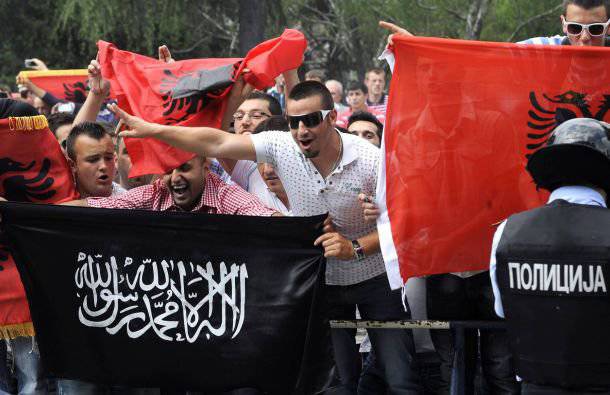
The fighting in Serbian Kosovo led to the fact that a stream of refugees poured into Macedonia - mainly Albanian nationalities, which contributed to the growth of the already rather big Albanian population of the country. Kosovo Albanians influenced Macedonian and in terms of the approval of separatist sentiments, the idea of creating a “Great Albania”. At the end of 1999, following the pattern and likeness of the Kosovo Liberation Army, the National Liberation Army was created in Macedonia, headed by Ali Ahmeti. Officially, it declared its goal of an armed struggle for the creation of Albanian autonomy within the confederative Macedonian state, but the Macedonian authorities rightly saw there real separatism and the prospect of rejection of the north-western territories with areas of compact residence of Albanians from the country. In January, 2001. Albanian extremists launched regular attacks on military units and police in northwestern Macedonia. In addition to attacks on authorities, Albanian militants terrorized the peaceful Slavic and non-Albanian population in the north-western regions.
In the city of Tetovo, a kind of Albanian capital of the country, where an Albanian university has been operating since 1995 and where 70% of the population is Albanian, clashes between law enforcement forces and Albanian extremists took place in March 2001. On March 15, 2001, gunmen fired at police officers in Tetovo and freely left for Kosovo. On March 17, 2001, Albanian extremists attacked a police station in Kumanovo. The Macedonian armed forces were forced to intervene in the conflict. On March 19, the Macedonian entered Tetovo. TanksOn March 20, artillery shelling of the positions of Albanian militants was launched, and on March 21 Macedonian helicopters hit Albanian positions. By March 27, the Macedonian forces, pushing the Albanian militants into Kosovo, reached the border of the country, freeing a number of villages.
In June, 2001, the Macedonian army surrounded the village of Arachinovo, where the 400 militants of the autonomous non-profit organization were based. Together with the militants, the 17 of American military instructors were also surrounded. However, all of them were rescued by the private military company MPRI with the actual support of the American contingent, which played the role of a human shield between the Macedonian troops and the Albanians and allowed the militants of the Autonomous Non-Profit Organization to leave the village unhindered. On August 10-12, the special forces of the Ministry of Internal Affairs carried out a sweep operation in the village of Lyuboten, as a result of which 10 was shot by Albanian militants. It is indicative that for this the commander of the special forces of the Ministry of Internal Affairs, Johan Tarchulovsky, was transferred to The Hague and was sentenced to ten years in prison by the International Tribunal.
Is there sovereignty?
As we see, in Macedonia, the USA and NATO also provided actual support to the Albanian separatists, but did not go to open aggression against the Macedonian state as the Serbian scenario, since Macedonia never acted from the anti-American positions and positioned itself as a satellite of NATO and the European Union. Therefore, the United States and NATO put pressure on the Macedonian government and it abandoned the policy of using force to suppress Albanian illegal formations. 13 August 2001 The Ohrid agreements between the Macedonian and Albanian political parties were concluded. In particular, they provided for the gradual decentralization of the Macedonian state towards the expansion of the rights of the Albanian minority. In reality, this means the gradual legalization of Albanian separatism. The areas of compact residence of the Albanians in every possible way demonstrate their “otherness”, emphasize the temporality of their formal stay as part of Macedonia. Here they do not hesitate to raise the Albanian flags above the buildings, moreover - the Albanian police, staffed by former militants of the Autonomous Non-Profit Organization, has been formed.
But even the Ohrid agreements did not guarantee Macedonia peace in its territory. Since Albanian militants understand only force and see such negotiations as a manifestation of the weakness of the Macedonian state, and in the mediation of the United States and Europe, Western support for the Albanian movement, they turned to more radical actions. In addition to the moderate National Liberation Army, the Albanian National Army also operates on the territory of Macedonia. It officially sets as its goal the creation of “Greater Albania”. Already after the Ohrid agreements 2001, the ANA continued armed attacks and sabotage against the Macedonian authorities and the peaceful Macedonian population. The areas of compact residence of Albanians along the border with Kosovo have become, thanks to the activities of the ANA, a real “hot spot”. Periodically, real clashes between the Macedonian security forces and Albanian militants occur here. The latter, however, do not neglect to detonate bombs in the Macedonian capital Skopje, to seize hostages from among the peaceful Macedonian citizens - all with the tacit connivance of the “world community” represented by the United States and the European Union.
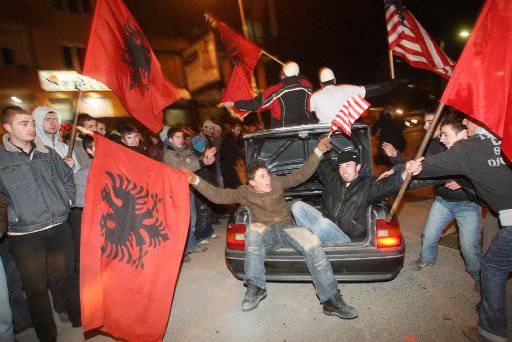
Almost every year in the Macedonian cities mass riots occur, initiated by the Albanian radicals, and the direct participants are Albanian unemployed youth. Due to the low level of education, high birth rate, scornful attitude towards peaceful professions, Albanian youth joins the ranks of the city lumpens and marginals, or embarks on the path of criminal activity, engaging in drug trafficking, armed attacks, etc. Such a social environment turns out to be very receptive to the calls of the separatists, especially if the latter guarantee weapons and cash when joining their formation.
It is obvious that the Albanians, even if taking into account their “youth” in comparison with the Slavic population (due to high birth rates) and radicalism, would not have been able to withstand in full measure the security forces of Macedonia and, especially, Serbia, do not use the support of the United States If Islamic fundamentalist organizations in the Middle East provide direct financial, material and personnel assistance to Albanian separatists, the United States and the European Union countries actually legitimize Albanian extremist activities on an international scale, declaring Albanians a discriminated minority, supporting their activities through pseudo-peacemaking operations.
In turn, the Macedonian government, being a pro-Western satellite, does not think to counter the real threats to the territorial integrity of the country, the security of the Slavic population, the survival of the Slavic culture and the Christian religion in this ancient region. Thus, in 2008, the Macedonian government officially recognized the sovereignty of Kosovo, thereby transgressing the interests of its Slavic and Orthodox neighbor Serbia and its relatives in the cultural, linguistic and religious sense of the Kosovo Serbs. Obviously, the desire to demonstrate their loyalty to the United States and European Union countries turned out to be more important for the Macedonian government.
Thus, we see that the political and economic situation in Macedonia in the twenty-three years that have passed since the country's independence was declared has seriously deteriorated. Although the country seems to be “sovereign”, no one listens to its voice, not only on a world scale, but also on a European and even Eastern European scale. To defend itself against external and even internal enemies, the country is unable, as well as to ensure a decent existence of the majority of its population. The problem of mutual relations with the Albanian part of the country's population, which is growing numerically and radicalized, feeling fed by the USA and the Islamic world, exacerbates with each passing year, puts Macedonia on the verge of a possible civil war and total social collapse.
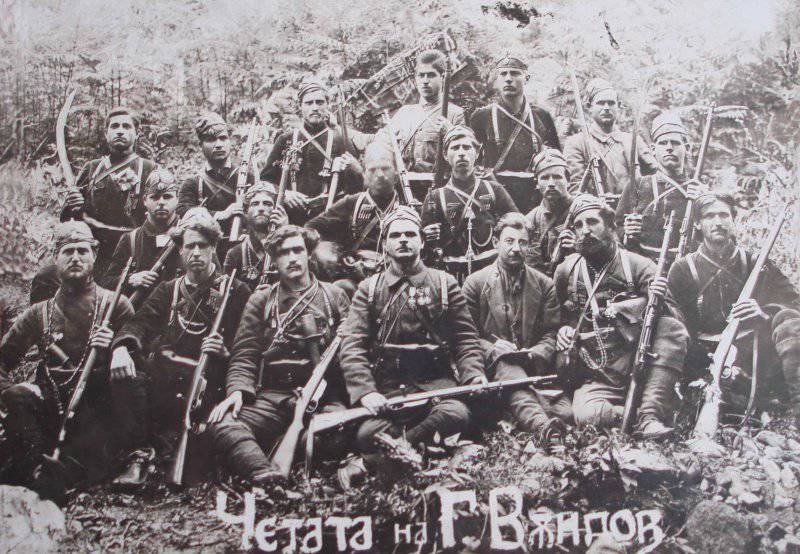
Information